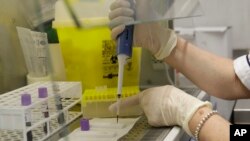A new study led by the U.S. government has found that a new strain of the novel coronavirus that is prevailing worldwide is spreading faster than earlier versions.
The study led by scientists at Los Alamos National Laboratory said the new strain, a mutated form of the original coronavirus, was detected three months ago in Europe. It traveled quickly to eastern U.S. states before becoming the world’s most dominant strain since mid-March.
The scientists who wrote the report said their findings have prompted an “urgent need for an early warning” to vaccine and drug developers to produce solutions that will be effective against the new strain.
The new strain has rapidly infected many more people than the earlier iterations that spread beyond the city of Wuhan, China, the report said. Within weeks, it was the only strain in countries affected by the coronavirus.
The study found the new strain to be more infectious, although the reasons have yet to be determined. The new version does not appear to be more lethal than the original, though people with the mutated strain seem to have higher viral loads.
The study warns if the pandemic does not diminish as the weather gets warmer, the virus could continue to mutate as work continues to develop vaccines and other medical treatments.
The study’s authors said the effectiveness of new medical treatments could be limited if the global scientific community does not get ahead of the risk posed by the new strain.
Why Does a Virus Make Some People Sicker Than Others?
Some experts are skeptical, however, of the findings in the study, conducted in collaboration with researchers at Duke University in the U.S. state of North Carolina and the University of Sheffield in Britain.
The consensus among scientists is that coronavirus mutations are not surprising, and that its various strains remain functionally identical. Moreover, there is no scientific consensus that any of the mutations have altered its ability to spread or its lethality.
The scientific community now must conduct an intense evaluation of the study to determine the accuracy of its findings.
Los Alamos National Laboratory, based in the southwestern U.S. state of New Mexico, is part of the U.S. Energy Department.








